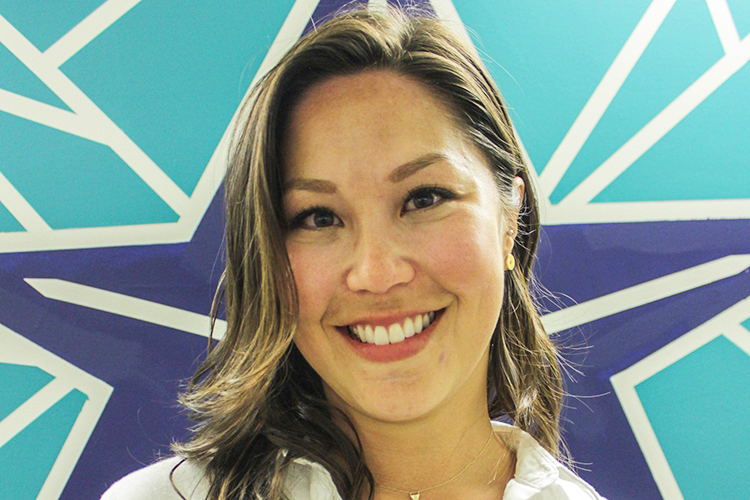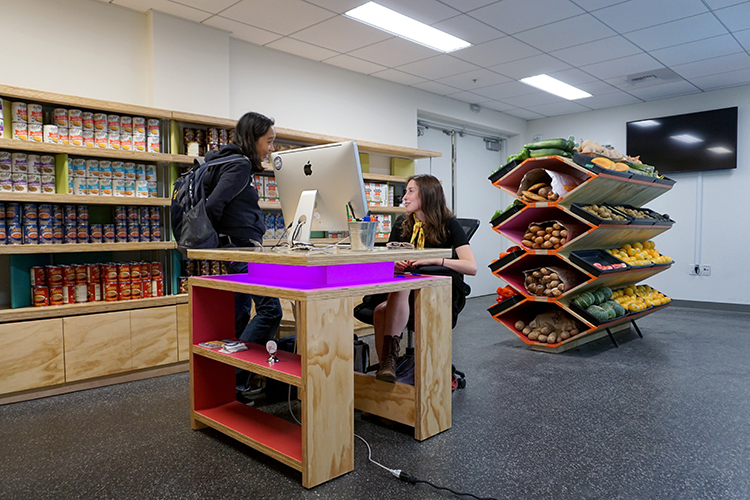Q&A: Michelle Thomas, Berkeley’s first-ever basic needs manager
Michelle Thomas says holistic approach is best for students in distress

September 5, 2018
Monday, Sept. 10, will be Michelle Thomas’s first day as UC Berkeley’s basic needs manager, a new role in the Division of Equity and Inclusion. Thomas — a licensed clinical social worker proficient in helping children, adolescents and families in community-based and outpatient crisis settings — will oversee the campus’s basic needs programs and services and provide case management for students experiencing financial, food and housing insecurity. Among her priorities in 2018-19 will be readying the new Basic Needs Center for its grand opening in January and working with on- and off-campus partners to shape protocol for homeless students.
UC Berkeley News recently spent time with Thomas and asked what energizes her work and why it’s important to treat those in need with a holistic approach.

Michelle Thomas, the new basic needs manager on campus. (UC Berkeley photo by Jeremy Snowden)
Tell us a bit about your upbringing. Did it inspire your social work?
How I see the world and my commitment to public service are deeply rooted in my dad’s faith and his insistence on our family being involved in social ministry. He’s originally from Minnesota and is Lutheran, and I was raised Lutheran.
He is really passionate about opportunities to serve, and when I was younger, our family took part in hosting meals at our church, where we broke bread with those who were homeless and who didn’t have food. My brother and I would sit facing strangers, and that was important to my parents, that there be a relational aspect to sharing a meal and a human experience. We were privileged and fortunate with the resources we had at hand, and it was expected that I would always be thinking about the person who had less.
My mom, who was born in Japan, is fiery and politically vocal and active. Her lens of dedication to public service came from learning when she was older that her grandfather and uncles were sent to internment camps during World War II. Because shame is an experience deeply connected to Japanese culture, her family hadn’t spoken about it. My mom’s mother — my grandmother — had been spared because she’d been sent from the United States, where she was born, to Japan.
As a social worker for 10 years for children, adolescents and families, what did you learn about basic needs security and behavioral health?
As an individual tasked with addressing the primary mental health needs of individuals, a huge theme in my work has been that we can’t be successful if our clients and their families are struggling with basic needs.
I remember a 16-year-old teen on probation in San Francisco who had complex issues related to trauma and who suffered from PTSD and anxiety. But I couldn’t jump in and address his mental health needs because he had a more immediate and fundamental need — he and his family were homeless. His mom had been evicted from her apartment, they were at a shelter in the Tenderloin, and after his classes at a continuation high school ended at 12:30, he had nowhere to go until the shelter reopened at 6. This was a problem, since he was on a strict curfew through probation. And on the streets, he was exposed to drug use and people with their own sets of struggles.
It would have been a miss on my part to focus only on his mental health needs when he needed a more holistic approach. I could have brought him to my office for sessions, but it would have been hard to focus on a treatment plan when a huge driver of his troubles was that he didn’t have a home. Addressing mental health needs in a vacuum isn’t effective. Often addressing basic needs first is a way to engage clients. I’m interested in a systems approach — family environment, school environment, and what’s happening there, how there can be better collaboration.

Students visiting the pantry this semester will find colorful shelving made by high school students in a College of Environmental Design program during the summer. (CED Fabrication Shop photo)
What excites you about your new job at Berkeley?
Part of it is thinking about the work from a holistic, curious, client-centered approach — considering what’s happening with a student and how to address that student’s needs more holistically. And then helping that student, through individual case management, to learn to navigate complex systems to get support in a way that honors and respects the student’s humanity. We need to ensure that all students enrolled at Berkeley are having their needs met for food and housing. No matter what, we need to serve them and not give up on anyone.
The majority of my work has always been with individuals who are 14 to 20 years old, many transitioning into adulthood. My job at Berkeley will be an intersection of what I love to do — the macro and the micro. I can still work directly and individually with students, but I’ll also be helping to manage basic needs efforts and addressing issues of social justice and equity on a larger scale, through advocacy or policy work.
And the people at Berkeley are amazing. It’s a world-renowned educational institution, and with all the energy, dedication and innovation here, who wouldn’t want to be connected to that?
What will some of your biggest challenges be?
It’s still hard for people to understand the plight of those with unmet basic needs, which are sometimes invisible. In many communities, there are numerous narratives that exist related to basic needs: Why do people need welfare? Why does WIC (the federal nutritional program for women, infants and children) exist? If you have a job, why do you need CalFresh? These conversations happen even here on campus.
People’s belief systems and values are often shaped by their own personal experiences, which make it a challenge for them to understand the experiences of others. Lots of people are so far removed from the lives of those who are undocumented or formerly incarcerated or who have been foster youth that they are skeptical about why these individuals struggle, and struggle financially.
But I believe people connect with personal stories, that there’s power in story narrative, and that when they can get to know someone in need or someone with a different life experience, it can shift their belief system and counter their assumptions. There’s also power in data and information, and using both can shift the conversation so that basic needs are seen as a responsibility of the entire community. I feel incredibly honored to be in this role, continuing the efforts of the UC Berkeley Basic Needs Committee and leaders. My hope is that basic needs are seen as fundamental to the health and well-being of the campus community as a whole, and that my efforts will support the collective ownership of this issue.